
Dr. Sucheta
Bhide Chapekar: 60th birthday celebrations at Pune
- Sunil Kothari
e-mail: sunilkothari1933@gmail.com
Photos courtesy: Kalavardhini
January 5,
2009
Titled 'Parikrama:
a journey that never ends,' Sucheta Chapekar's (nee Bhide) disciples and
her Kalavardhini Trust organized a three day event (Dec 4 – 6, 2008) consisting
of performances of few select students of hers, a seminar, performances
by her contemporaries like Darshana Jhaveri (Manipuri), Sonal Mansingh
(Odissi), Deepti Omcheri Bhalla (Mohini Attam) and senior guru and Bharatanatyam
exponent CV Chandrasekhar and one evening devoted to her felicitations,
her performance including her seminal work on Nritya Ganga with Hindustani
music and screening of 'Vyomagami,' a film on her life and career.
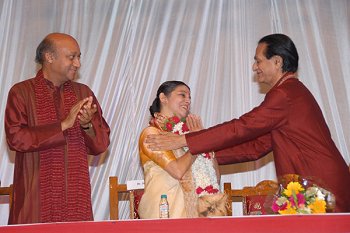 Industrialist
Madhur Bajaj of Bajaj Autos, Sucheta Chapekar, CV Chandrashekar
Industrialist
Madhur Bajaj of Bajaj Autos, Sucheta Chapekar, CV Chandrashekar
|
It was sheer bliss
to be a part of these events held at Pune. The major reason was the faithful,
music and dance loving audience, and a large turn out of her admirers who
from 6.30pm till 11pm at night, watched performances and displayed commendable
respect for the visiting artists, for Sucheta and the proceedings.
Outstation
artists were bowled over by the response. Living as I do in Delhi, the
capital, (veteran critic late Subbudu used to say, "To live in the Capital
is a capital punishment!") and most of us who came from Delhi, Mumbai,
Chennai realized how major metropolitan cities have been treating culture.
CV Chandrasekhar said before starting his performance after three dancers'
presentations, at 10pm to a full house audience, "We are overwhelmed by
the presence of the rasikas, connoisseurs, with their love for dance and
watching us even when it is getting late. If it were Delhi, by 8.30 people
would leave the auditorium, if it were Chennai, few would be present, maybe
ten or twelve, and if it were Mumbai no one would wait to watch classical
dances for more than an hour! And to see you all tonight we are astonished
and also reassured of your genuine love for dance and music and the courtesy
you have shown us!"
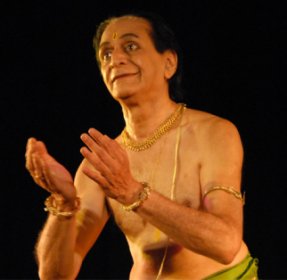 CV Chandrashekar
CV Chandrashekar
|
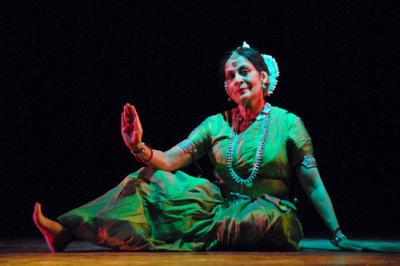 Sonal
Mansingh
Sonal
Mansingh
|
Indeed it was
a refreshing experience. Pune has won that special qualification. 'Punya
nagari,' Pune has a great tradition of all night Sawai Gandharva, an all
classical Hindustani music festival, ending in the wee hours of the morning.
On account of trying times and terrorist threats, the music sessions now
end by midnight. Ten thousand strong audiences feasting their ears on classical
music for four nights, listening to the great musicians is a rare event.
The day we arrived, the tickets for Sawai Gandharva music festival were
on sale and we were told that by the evening tickets, were sold out! Such
love for music made those of us staying in the Capital feel 'blasé!'
I am writing
this from Chennai. It is the 'mad, mad, mad, mad Madras season' as it is
known. I am attending it for the past more than 30 years and am aghast
at the number of events organized throughout the two month long period.
Barring the senior and well established musicians and dancers, this proliferation
of events, dancers and musicians is becoming counter productive, as the
audiences in the hall are so few, and it seems in spite of that, the artists
go on performing, to near empty halls.
The contrast
in Pune therefore was soothing. Sonal Mansingh (nee Pakvasa), Sucheta Chapekar
(nee Bhide), Darshana Jhaveri, Kanak Rele (nee Divecha), Maya Kulkarni
(now settled in New York) are all contemporaries. Forty years ago we all
sprung on the dance scene and by sheer dint of hard work, talent and persistence
have made a mark on the dance scene, nationally and internationally. I,
as an young up-and-coming critic / scholar, honed my skills watching their
performances, attending their practice lessons, and was groomed by
Dr. Mulk Raj Anand, K Bharata Iyer, the scholar and author of that amazing
book 'Kathakali: The sacred dance-drama of Malabar,' Dr. Moti Chandra,
the scholar and Director of Prince of Wales Museum, senior dancers
like the Jhaveri sisters, their guru Bipin Singh, Sitara Devi,
gurus like Kathak maestro Lachhu Maharaj, Bharatanatyam gurus
like Mahalingam Pillai, Govindaraj Pillai, Kalyanasundaram Pillai - Mumbai
was the seat of culture and Brijnarain-ji's Sur Singar Samsad was our launching
pad. Annual Swami Haridas and Kal Ke Kalakar Sammelans were our forum,
as was Bhulabhai Desai Memorial Institute, where Soli Batliwala (Solimama)
offered us opportunites to display our art.
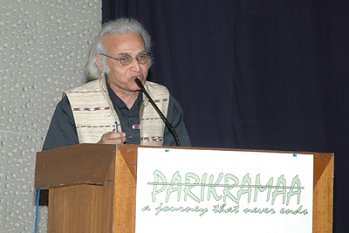 Sunil
Kothari
Sunil
Kothari
|
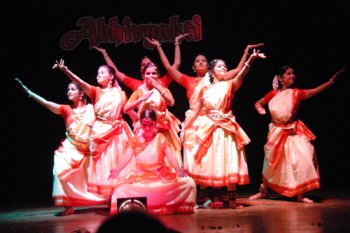 Parikrama
theme dance
Parikrama
theme dance
|
Dr. Mulk Raj Anand
called us 'the Bloomsbury crowd of Bombay' and used to indulge us. His
wife Kathak dancer Shirin Vajifdar and Bharatanatyam dancer Ritha Devi
used to review performances as dance critics for The Times of India. Later
on, I was graduated to their company and started writing for The Times
of India publications and through media, we drew attention of the cognoscenti
and became well known.
Sucheta studied
under Acharya Parvati Kumar and later on under Tanjore Kitappa Pillai.
These dancers
were not only beautiful but all had a serious attitude, desire for acquiring
knowledge, research, dedication, grit and substance. Sucheta moved to Pune
after marriage. Sonal moved to Delhi, Kanak and Darshana stayed back in
Mumbai, I moved to Kolkata, but we all remained in touch. When I received
an invitation to moderate the seminar in the morning session on 5th December,
I was skeptical and worried. With six persons speaking each for even 20
minutes, who will stay back? But to our utter surprise and delight the
auditorium was full and none left.
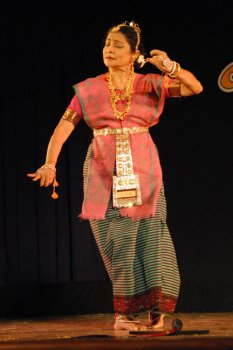 Darshana
Jhaveri
Darshana
Jhaveri
|
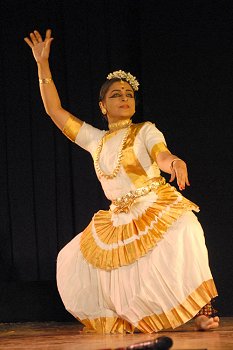 Deepti
Bhalla
Deepti
Bhalla
|
The symposium,
held at S M Joshi Foundation Hall, was given the name 'Samvaad.' Prof.
C V Chandrasekhar spoke on how relevant classical dance is today. Darshana
Jhaveri explained and demonstrated Manipuri items, and screened slides
of Imphal, Manipur, dances performed in the temple for her topic 'From
Temple to Theatre.' Sonal Mansingh dwelt upon abhinaya as a means
of communication; Deepti Bhalla demonstrated salient features of Mohini
Attam which were appreciated with spontaneous applause. Shama Bhate explained
with demonstration, how Kathak has retained its essential core as a dance
form with changing times. I had to summarize at the end and reiterated
faith in classical dances, emphasizing that they will not lose their relevance
come what may.
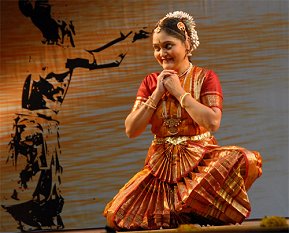 Smita
Mahajan
Smita
Mahajan
|
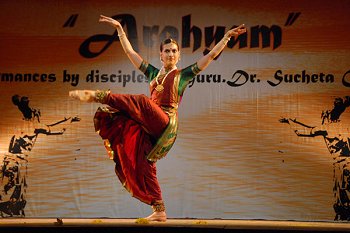 Pauline
Reibell
Pauline
Reibell
|
Since I arrived
late on 4th December night, I missed the performances titled 'Arghya,'
offerings by Parimal Phadke and Smita Mahajan (Bharatanatyam), Nritya Ganga
(Pauline Reibell, Rama Kuknur and Yashoda Patankar, all disciples of Sucheta.
Those known for their critical appreciation told us that they all did Sucheta
proud. A unique Vadya-Laya ensemble 'Soundarya Laya' brought together
two different dimensions of Indian classical music using dozen string and
percussion instruments, a brain child of S. Shankar Narayan and B Anantharaman
alias Ravi. Kathak exponent Shama Bhate was the chief guest. The venue
was Balgandharva Rangamandir which I was told, with a maximum capacity
for more than 1,000 people, was full. Alas, I missed this well designed
event.
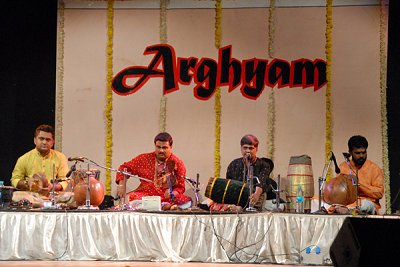 Soundarya
Laya
Soundarya
Laya
|
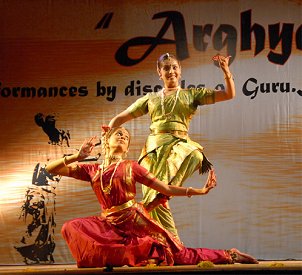 Rama Kuknur
and Yashoda Patankar
Rama Kuknur
and Yashoda Patankar
|
'Abhivyakti,'
a creative resurgence, consisted of the performances by veteran dancers
Sonal Mansingh (Odissi), Darshana Jhaveri and her disciple Gyaneshwari
Devi (Manipuri), Deepti Omcheri Bhalla (Mohini Attam), and Prof CV Chandrasekhar
at Chandrasekhar Sabhagriha IUCAA, University of Pune. To individually
compliment each seasoned dancer would be like 'gilding the lily.' They
gave their best and the audience showed their appreciation watching till
11pm. In particular Mohini Attam as it is rarely seen in Pune and the item
of mridang vadan, playing upon Pung (Manipuri drums) in a sitting
position on the stage, by Darshana Jhaveri and Gyaneshwari Devi were received
enthusiastically for the element of novelty and surprise, as women are
not generally seen playing upon Manipuri drums. Deepti Bhalla's own creative
composition based on talas was outstanding.
 Abhivyakti
Abhivyakti
|
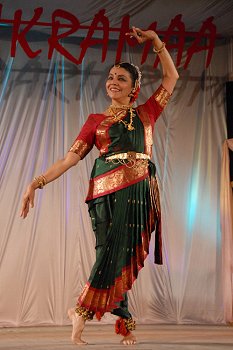 Sucheta
Chapekar
Sucheta
Chapekar
|
Sucheta's performance
of traditional Margam with Marathi padams and few numbers from Nritya Ganga
evoked a sense of wonder. In physical form she has retained the freshness
of her youth. It looks like she has not aged. Her inner self and outer
self appear balanced. There is a certain quiet, vishranti, and there are
neither demands nor complaints. All this adulation, praise et al, sits
lightly on her. She does not make any fuss, accepts encomiums gracefully.
She has earned it and if the rewards have come, she is happy.
A book in Marathi
of her reflections on life and dance, mirrors her philosophy for life.
A galaxy of leading personalities from dance, music, education, disciples,
sponsors, promoters, admirers, some elders, some contemporaries spoke warmly
about her contribution, single minded dedication, devotion and giving,
sharing knowledge liberally.
The film Vyomagami
captures her in the role of a housewife, dancer, teacher, researcher, choreographer,
a mature artist who speaks about life and art in clear terms without making
it profound. There is an enviable simplicity in Sucheta's life. Multi-tasking,
carrying her mission without any noise or seeking publicity, she has as
one saw, inculcated values in her students. Interacting with her
married daughter Arundhati Patwardhan and disciple Juee, I could see how
Sucheta has succeeded in achieving her goal and has tremendous inner strength
and peace.
May she continue
her work and transmit the values which she cherishes to her innumerable
disciples and live long.
 Dr.
Sunil Kothari, dance historian, scholar, author, is a renowned dance critic,
having written for The Times of India group of publications for more than
40 years. He is a regular contributor to Dance Magazine, New York. Dr.
Kothari is a globetrotter, attending several national, international dance
conferences and dance festivals. He has to his credit more than 14 definitive
works on Indian classical dance forms. Kothari was a Fulbright Professor
and has taught at the Dance Department, New York University; has lectured
at several Universities in USA, UK, France, Australia, Indonesia and Japan.
He has been Vice President of World Dance Alliance Asia Pacific (2000-2008)
and is Vice President of World Dance Alliance Asia Pacific India chapter,
based in New Delhi. A regular contributor to www.narthaki.com, Dr Kothari
is honored by the President of India with the civil honor of Padma Shri
and Sangeet Natak Akademi award. Dr.
Sunil Kothari, dance historian, scholar, author, is a renowned dance critic,
having written for The Times of India group of publications for more than
40 years. He is a regular contributor to Dance Magazine, New York. Dr.
Kothari is a globetrotter, attending several national, international dance
conferences and dance festivals. He has to his credit more than 14 definitive
works on Indian classical dance forms. Kothari was a Fulbright Professor
and has taught at the Dance Department, New York University; has lectured
at several Universities in USA, UK, France, Australia, Indonesia and Japan.
He has been Vice President of World Dance Alliance Asia Pacific (2000-2008)
and is Vice President of World Dance Alliance Asia Pacific India chapter,
based in New Delhi. A regular contributor to www.narthaki.com, Dr Kothari
is honored by the President of India with the civil honor of Padma Shri
and Sangeet Natak Akademi award.
|

